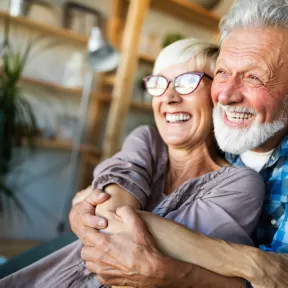Human beings are sexual, aggressive, and social creatures. Sexual attraction is determined by many factors—organic (i.e. chemistry), relational (mature replacements for mom and/or dad) and environmental (social and cultural). Pop culture tends to drive what is, well, popular. Social mores change to reflect the culture; culture is king and to a certain extent, queen.
To think that how we perceive what is sexy or whom we find attractive is based on rational thought is naïve; the primitive brain tends to drive this proverbial bus.
But, our primitive brain is under constant assault and control by our culture. Thoughts and beliefs may be controlled heavily by culture, but how we choose to respond is based on our own choice.
Consider a recent cover of Sports Illustrated, the annual swimsuit edition…well, minus the swimsuits. It was never really about swimsuits anyhow, so maybe removing most of the suit is more honest. The models Chrissy Teigen, Lily Aldridge, and Nina Agdal have or appear to have hot bodies. The likelihood that their bodies have been Photoshopped to smooth out skin irregularities like cellulite, fat deposits, or sagging skin is great. And, all of them have their backs arched slightly so that the skin around the buttocks is pulled to reduce the appearance of imperfections. Oh yeah, this edition of Sports Illustrated also commemorated the 50th anniversary of Barbie—a perfectly sculpted, though disproportionate, desired body type.
So, what’s the point?
The point is that culture and media do succeed at deciding what is or ought to be visually desirable, regardless of our own intuitive draw or what we really want or find attractive. Despite Photoshop, disproportionate bodies, i.e. Barbie, we follow along and want what is not possible for anyone, yes, anyone to have. Photoshop is magic. Magic appears real. We want it and will try almost anything to have the ideal. We will seek to buy it or diet in the hopes of having it. The only problem is that there is never an endpoint because the ideal is unattainable. We act as if we can overcome that one detail.
Seeking the body ideal is not like seeking the American Dream. We are determined by our genetics and cannot work our way to the top in order to negate or conquer our genetics. We can pay for a lot of beauty products and plastic surgery to enhance, support, beautify our looks and keep us feeling attractive in our culture, but there are limitations. Products and surgery cannot change our hip size, height, change how our bodies use and store fat, give us genetically modified skin or change the shape of our legs. Products and surgery can enhance, not create self-esteem. But, we will still keep on trying.
article continues after advertisement
If our brains are manipulated into believing what the media tells us regarding physical desirability, then can we not take the bait? So far, it seems that the media has succeeded in conditioning our response—ideal body is good—any other body type is bad. Can we un-ring the bell, Pavlov, and go back to our own intuitive sense (unconditioned response) and primal lure of attraction?
Probably not. Besides, lots of men and women, from all sexual orientations, want to be or be with the cultural ideal. Such a conquest constitutes success, outdoing the competition, and relishing in the envy of others. What happened to love?
The media can, however, guide a new response if it refrains from the use of Photoshop in advertising. But, the likelihood of this happening…probably not very good. Why show the truth when un-truth sells more clothing, beauty, and diet products?
Altered beauty didn’t even begin with Photoshop. Airbrushing, the pre-cursor to Photoshop, has been around even before the advent of Playboy magazine. We have been constructing and deconstructing beauty for a long time based on a single camera frame.
On my Facebook newsfeed was a post of a picture by a “friend of a friend” of a very large backside of a woman. She had an off-centered tattoo just above her buttocks and very low-cut jeans. Every comment was negative—insults, visceral statements of disgust and shaming comments about her size were posted publically.
It was unnerving and upsetting to see the callousness, disregard, and absence of any pleasantry toward the woman. Forget about anyone finding her attractive; those comments were nowhere to be found. Perhaps no one, left to his or her own instincts, would find her attractive; this is of course OK. However, to demean her is hitting below the tattoo. Unfair and unkind.
So our media-driven culture not only controls who is attractive, but also allows for insults to be hurled against anyone who it deems unattractive.
Food for thought—If we accept that we are trapped (for now) by cultural dictates regarding beauty can we at least stop hurling insults and criticisms against those who do not fit the beauty bill? There is a line in there about being all Mother Nature’s creatures.
article continues after advertisement
It is valid to be concerned and angry with the acute and chronic health issues that face many obese Americans. Issues of premature mortality, poor quality of life, and increasing health care costs are real and continue to burden our health care system, not to mention cost us more in insurance and taxes. However, is it necessary to heap criticism and insults about someone’s physicality in conjunction with concern for their health?
Hurling insults at people’s bodies does nothing to help our health care crisis. But not hurling them can keep the focus on health and nutrition rather than on reinforcing the cultural mindset that inexorably passes judgment or somehow thinks we have the right to publically shame people if they are not visually or culturally pleasing. We seem to feel entitled to criticize even those who are not obese, but who still do not have the ideal body.
Is our own quality of life better because we diss another?
Best,
Judy Scheel, Ph.D., LCSW









